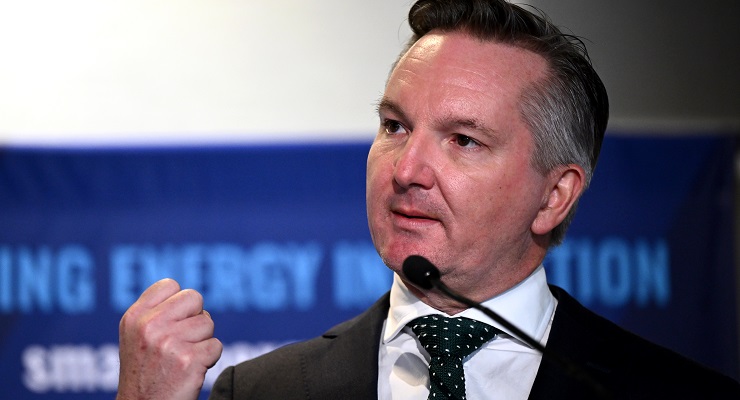
Chris Bowen’s first six months in office saw him meet with billionaires, journalists, energy leaders, and business groups, according to his diary, but climate advocacy groups were granted less of the climate change and energy minister’s time.
The diary was disclosed late last week following several freedom of information requests, and arrives in the midst of a broad push for the ministerial diaries of senior figures in the Albanese government, after Treasurer Jim Chalmers and Workplace Relations Minister Tony Burke disclosed theirs.
After taking a week to settle into his office, Bowen’s first order of business was an ongoing meeting with the United Nations Framework Convention on Climate Change, beginning on June 6.
His first media appointments, kicking off with the ABC’s Patricia Karvelas and Guardian Australia’s Katharine Murphy, flowed in through the week, along with a catch-up with “Snowy Hydro” (presumably Paul Broad, who just months later would resign after a series of blowouts with Bowen), before taking a Friday lunch with Origin Energy chief executive Frank Calabria.
Later in the month, he took a meeting with Climate Action Network Australia on June 20, followed by a joint meeting with the Australian Council of Social Service, financiers AiG, the Energy Efficiency Council, and the Property Council.
That same day, he met with Greens Leader Adam Bandt, before sitting down with representatives of Sun Cable, the renewables firm backed by iron ore magnate Andrew Forrest and Atlassian boss Mike Cannon-Brookes, who each had lofty ambitions to export solar to Singapore, before it all fell apart.
In the lead-up to legislating Australia’s emissions reduction ambitions in early August, Bowen’s attention turned to senior figures across the energy market, after meeting with Australian Energy Market Operator chair Drew Clarke, and Australian Energy Market Commission chair Anna Collyer.
A week after the legislation passed, Bowen started to work the field.
In the space of three days, from August 8, he met with Toyota Australia’s president and CEO, Matthew Callachor, and Electric Vehicle Council chief executive Behyad Jafari. He then took meetings with Whitehaven Coal — one of Australia’s largest coal producers, currently in a fit over NSW plans that would force them to hold reserves for domestic energy supply — as well as MGA Thermal, Bloomfield Group, and a general meeting with power industry delegates.
The month would eventually draw to a close with back-to-back appointments in Bali, where Bowen spent time “to support the Indonesian G20 presidency” and take a host of meetings, alongside Environment Minister Tanya Plibersek, mainly related to bilateral “global energy transformation” initiatives.
Once back in Canberra, Bowen’s focus would tilt to the government’s safeguard mechanism reforms, which continue to attract criticism today. September saw the minister commit to a range of meetings, presumably to secure support, including with Senator David Pocock and independent MP Allegra Spender.
Later that month, Spender would tweet screenshots of a letter she sent Bowen following the meeting, which outlined her concerns the reforms didn’t do enough to force polluters into “real reductions in emissions”, and that they were overly complex.
Moving into September, attention shifted again to Australia’s place on the global stage, in the lead up to COP27 in Egypt later in the year.
As part of that, Bowen would dart around the United States, spending time in both New York and Pittsburgh, where he would eventually take time out of an action-packed schedule to sit down with billionaire Bill Gates, months before Prime Minister Anthony Albanese eventually would.
October brought with it a series of redacted appointments, after Bowen touched down back in Australia, before checking in with Qenos chief executive Stephen Bell and CWP Renewables CEO Jason Willoughby (whose company would eventually get bought out by Twiggy Forrest).
Towards the end of the year, Bowen’s attention would turn to the design of the government’s safeguard mechanism reforms, consulting with a range of leaders, including Frédéric Baudry, president of BP Australia. (The Coalition is expected to announce its opposition to the reforms this week, forcing Labor to cut a deal with the Greens, who don’t like the package either.)
But before it could have his full focus, Bowen would have to ready himself for time away at COP27, where his performance was broadly welcomed with approval. Once he was back, he appeared eager to close a deal.
He went first to Bandt on November 29 (one of his last non-Labor parliamentary appointments of the year). Two days later, he took a late-afternoon meeting with Nationals MP David Gillespie.








I applaud ‘climate activists’, because mankind is failing to respond to ‘the greatest moral challenge of our time’, with Australia ranking near the bottom of the dunces of the world. But in my view it is entirely appropriate for Bowen to focus on the problem arena – which is the sectors which must be the focus of drastic change. Managing transition is his job, and spending time talking to lobby groups, even if they’re on the enlightened side, now that would the waste of time.
Achieving “reductions” is not enough; when these reductions are negligible, industry can continue with emissions as usual forever. Instead, the Minister for Climate should be setting a deadline for total conversion away from fossil fuels, after which all fossil fuel infrastructure must be bulldozed. As Minister for Energy, he should be assessing industry’s need for nonfossil energy and putting it in place in time for industry to convert.
Quickly reading the list of those consulted, it looks to me like he consulted quite widely.
And the point of the article is …..?
The information in your story does not support the lead sentence or headline